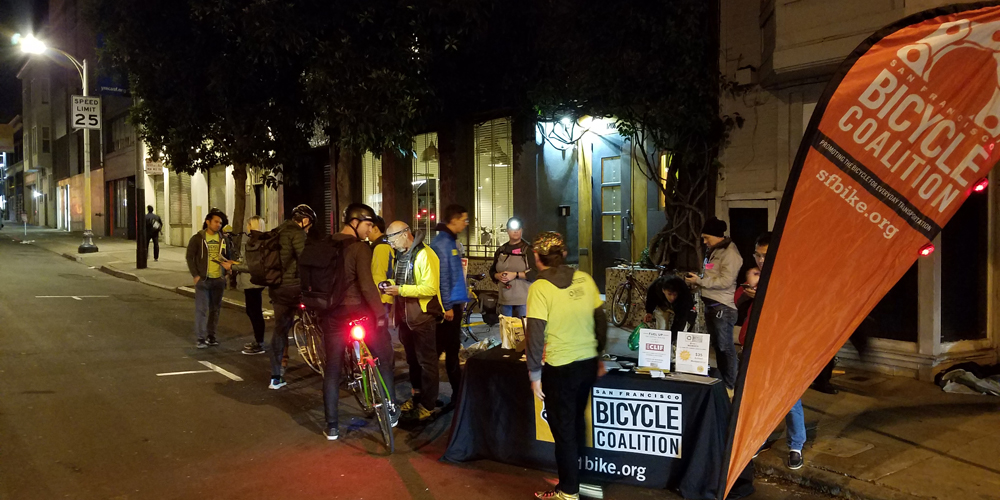UPDATE: Watch the recording of the candidates’ statements at our annual board meeting.
It’s time for the San Francisco Bicycle Coalition annual election of our all-volunteer Board of Directors. Here you will find information about the process, statements by the candidates, and links to questions you may have.
The timeline is:
- Online voting begins on Jan 22, 2024 and ends Jan 31, 2024 at 9:59 pm PST.
- Members will each receive an individual e-mail on Jan 22 with a code and link enabling them to vote. This code will be sent to the e-mail address on file through which the member receives communications from the SF Bicycle Coalition. Please add invitations@mail.electionbuddy.com to your contacts. If you do not see your invitation in your inbox, please check your spam folder.
- Opportunities to meet and hear from candidates will be available at our Annual Member Meeting on Jan 18.
- Only current SF Bicycle Coalition members as of Friday, Jan 12, 2024 at 11:59 pm PST may cast a ballot.
- Results will be announced in the Biker Bulletin email and on our website.
- If you have technical questions regarding voting, please contact our election administrators at boardvoting@sfbike.org.
ABOUT SF BICYCLE COALITION BOARD ELECTIONS
The San Francisco Bicycle Coalition is governed by an all-volunteer Board of Directors. Any SF Bicycle Coalition member can run for the board. The board is responsible for ensuring the organization’s financial health and achievement of its mission. The 15-member board is elected by the membership. There is a board election each year and terms are two years. Eight seats on the board of directors will be elected by the membership this year for the term beginning at the first board meeting following this election until the new board is seated following the 2025 board elections. A full timeline and detailed description of the process can be found here.
This will be our sixth board election using ranked-choice voting, giving members the chance to rank their votes in order of preference. Our board of directors adopted ranked-choice voting in the hope that it will encourage increased member participation in our elections and our work. For more information about multi-winner ranked-choice voting, click here.
If you are a member who is interested in learning more about board service in future years, please contact us at boardnomination@sfbike.org.
CANDIDATE STATEMENTS
All candidates completed an online questionnaire to declare their interest in running for the board. You can view all candidate questionnaire responses here.
All candidates participated in the board interview process.
MATT BIGGAR
he/him
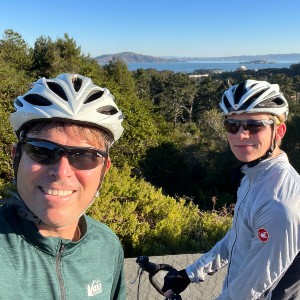
I’m a 20-year resident of San Francisco. I have been involved with fundraising, strategic planning, and advocacy for the Bike Coalition. My teenage son and I have raised over $20,000 for the Coalition and Walk SF through Climate Rides. I work as an independent consultant supporting nonprofits, government, and collaboratives with meeting facilitation and strategy. I facilitated the planning process for the Coalition’s 2018-22 Strategic Plan and have supported Safe Routes to School partnerships. I’ve conducted multiple published studies on transportation and public space, including an analysis of how the JFK Promenade was saved. I hope to support the coalition with my knowledge of organizational strategy, finance, and partnerships and how to make cities like San Francisco thrive with active transportation. I love San Francisco, biking, and working with others. I’m committed to helping the Coalition fulfill our mission of transforming streets into safe, bikeable spaces across San Francisco.
GARRETT BRINKER
he/him
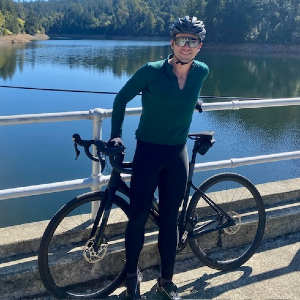
Biking, to me, transcends mere transportation. I’ve never owned a car, and so biking has enabled me to more intimately experience my community. It is how I explore both familiar and unfamiliar places in San Francisco and elsewhere, and is a powerful way to solve our most pressing issues – from climate change to more livable cities.
By day, I’m a Director of Partnerships at Via, working with transit agencies (including SFMTA) to build more convenient and equitable transportation systems. I’ve also been involved in many community volunteer roles, including: democratic political organizations, housing & transit advocacy groups, fundraising organizations, and the Alumni Board of my graduate school at Georgetown.
As a Board member, I hope to bring my experience and passion to fight for safer, more equitable streets – and to ensure that our city can become a more joyous, just, and livable place. I would be honored to have your vote!
IKE KHURGEL
they/them
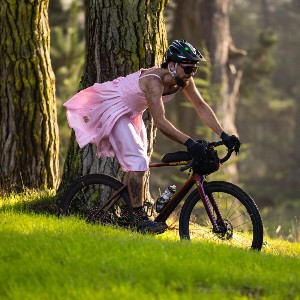
Hi, I’m Ike. And I love to bike. From point A to point B, to no point whatsoever – commuting, exercise, errands, fun – I love it all. I work at a bike shop, and it’s the best job of all time. Before, I used to work in Sustainable Finance (which was less fun, but demonstrates core competencies I believe would be useful to this role, namely: strategic planning, project management, stakeholder engagement, and of course, sustainable finance). I’m running for the SFBC Board because I want to support bicycle advocacy efforts in San Francisco, my home. I’ve lived in very bike-friendly cities in the past (Amsterdam being a shining example) and want to elevate a bike-friendly community – from getting more people on bikes, to improving infrastructure. If elected, I aim to support an organizational strategy aligned with member expectations, with a particular focus on effective, pragmatic, real-world impact. Thanks for reading!
It would be an honor to serve on the board and be able to support the work of everyone in the coalition to the best of my abilities.
WILLIAM MEE
he/him
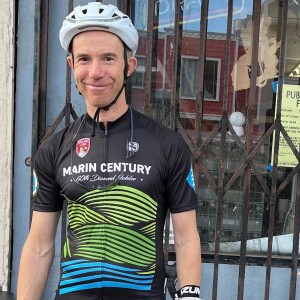
Will here! I’m a long-time member and volunteer of the SF Bike Coalition and an even longer-time cyclist: I’ve cycled for both sport and daily commuting throughout my adult life. Off a bicycle I engage further with the city: trail maintenance in the Sutro hills, serving meals at St Anthonys in the Tenderloin and fostering kittens (those both cute and with ringworm). I’m giving up work on the board of the San Francisco LGBT swim team to apply for the SF Bike Coalition board because I’m a huge beneficiary of the cycling advocacy the Coalition does and want to take my engagement to the next level. Outside “my work is bike” and being a volunteer, I’m an engineer who’s doing a part-time MBA.
MICHAEL NGUYEN
he/him
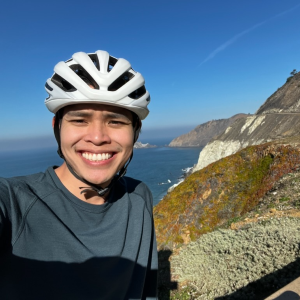
My name is Michael and I am running to offer the Coalition and its Board my passion for biking combined with nonprofit experience.
From commuting to bikepacking and competitive racing, biking has become a significant part of my identity and I am now seeking to expand this passion into forms of bicycle and pedestrian advocacy and stewardship.
I’ve volunteered with the Coalition in the past regularly in their workshop and in the office on volunteer nights. After a career transition, I am returning to the Coalition to continue volunteering and to provide strategic insights as the organization navigates this inflection point to recruit an Executive Director, define their vision, and facilitate a strong membership and fundraising strategy.
My background in nonprofit organizations, which includes finance/accounting and strategic advisory, aligns with these goals. It would be an honor to leverage these skills to contribute to the organization’s growth and success.
RYAN PATTERSON (incumbent)
he/him
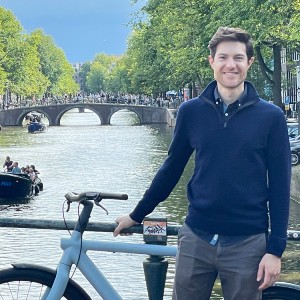
One of the first things I did when I moved here in 2011 was take a Bicycle Coalition urban cycling class. It gave me the confidence to ride on Market Street and pride to join this cycling community. I’m an avid bicycle commuter and an advocate for bike safety and increased ridership. I believe education, infrastructure, and community are key to achieving these goals, and that biking can make a vital contribution to public health, the environment, and a vibrant city. In addition to serving on the Bicycle Coalition’s Board of Directors, I have served on a number of other nonprofit boards. From these experiences, and my experience as a small business owner and land use attorney, I strive to bring practical skills to the Board to help with planning and
execution, especially on the Finance Committee. It would be an honor to continue serving for the next two years.
BRANDON POWELL (incumbent)
he/him
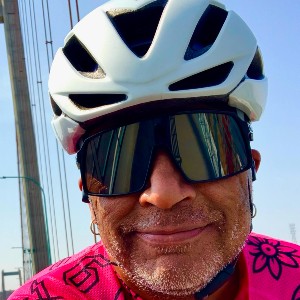
I am a lifelong cyclist, and some of my earliest memories are of riding with my father and brother. In the years since then, I have used a bicycle to commute, to compete, to exercise, to deliver pizzas, and to escape. Whether clipped in and wearing lycra or on flat pedals wearing business casual, my bicycle has been an instrument of freedom and joy.
I am currently on the SF Bike board and represent District 9 on the San Francisco Bicycle Advisory Committee. I am also a member of the Major Taylor Bay Area cycling club and have co-led our club’s annual Juneteenth community rides in Oakland.
SF Bike can transform our city through strong advocacy which demands progress—and accountability—from our government; programs which grow the number of people who use bicycles; and collaboration with organizations and individuals who share our vision.
We who live and work in San Francisco are entitled to safe streets, public spaces, and infrastructure which give priority to people and human-scaled mobility.
EMILY STEINGLASS
she/her
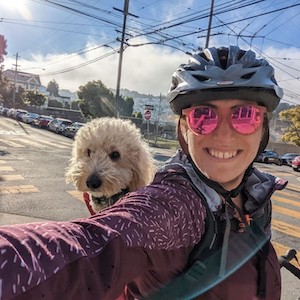
I’m honored to run for the SF Bike Coalition board. Biking has been a lifelong passion of mine, but after three knee surgeries, it’s taken on a deeper meaning for me, as a form of therapy for both my mind and body. I am now a proud triathlete.
I’ve shared this passion by teaching friends that it’s never too late to learn how to ride a bike. Now, I’m eager to become more involved with the SFBC.
As a Senior Business Operations Analyst for the Autodesk Education team, I advocate for students and schools ensuring the next generation has the skills to design and make a better world. In my role, I build meaningful relationships by actively listening to understand the needs and goals of others. I am also an agile problem solver who helps drive collaborative solutions.
If elected, I’ll leverage these same skills to advocate for the community, striving to create safer streets for all San Franciscans.
CHRISTINE P. SUN
she/her
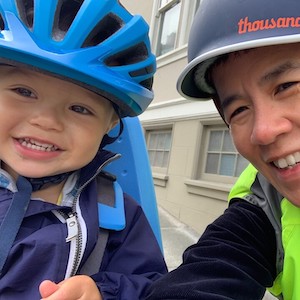
Bicycling almost always puts me in a better mood. Whether it’s cycling the hills of Marin on my road bike, or riding the streets of SF with my son on our cargo bike, I feel a sense of autonomy and respect for our community and nature that I never experience in a car.
It’s that passion for bicycling that I would hope to ignite and support as a Board member for the Bicycle Coalition. I believe strongly in the mission of the Coalition, and have experienced first hand the incredible progress that it has helped achieve in making our City’s streets safer for cyclists, pedestrians, and families. And of course, there’s always more to be done. I’ve spent most of my career as an advocate for civil rights – including as the former Legal and Policy Director for the ACLU of Northern California – and would seek to contribute those skills to support the work of the Coalition.
In addition to my advocacy skills, I have also previously served on the Board (and Executive Committee) of Asian Americans Advancing Justice – Asian Law Caucus, and been an active volunteer for SF New Deal and my son’s SFUSD elementary school. It would be an honor to be considered for the Board. Thank you!


